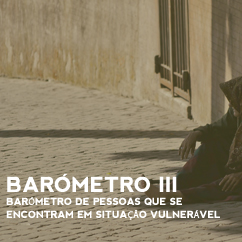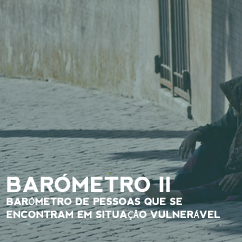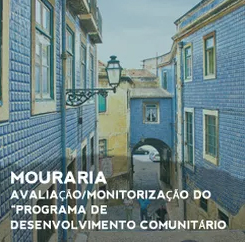Barometer of People who are in a vulnerable situation – Phase IV
This research, which began in 2011, included three waves of interviews (the first in 2011, the second in 2014 and the third in 2017), making it possible to follow a panel of 47 people who were in a vulnerable situation during this period of time and produce three reports that contributed to an in-depth understanding of the social processes at play through the interpretation and (re)construction of these people's life trajectories. As in Phase III, the central objective of the Barometer in this Phase IV is based on understanding the processes that accentuate or break cycles of vulnerability, through the analysis of access and appropriation of resources made available by public policies, but also of individual resources and design capabilities of the people who make up the panel. Based on the notions of time and change, it is important to: - Describe the type of change that occurs, in whom and in what, at what time and in what context, identifying the essential aspects and the interrelationships between them; - Analyze how and why changes occur, checking how individuals position themselves in the present moment, (re)interpret their life trajectory and project their future, and which individual and social resources are mobilized in the face of the opportunities available to them offered/denied; - Interpret the nature and meaning of these changes.
Project Information
2020-06-04
2022-03-30
Project Partners
- DINAMIA'CET-Iscte (GEC) - Leader
Barometer of People in a Vulnerable Situation - Phase III
A team has been conducting, since 2011, a longitudinal study, with a qualitative approach – Barometer of People in a Vulnerable Situation – within the framework of the Fight Against Poverty in the City of Lisbon Observatory, promoted by EAPNPortugal. With three sets of interviews it was possible to follow up on the same group of people in a vulnerable situation through time, meeting the research goals, specifically: detecting vulnerability processes concerning different poverty profiles and their repercussions in the life path; analysing individual resources and activation provisions aimed to building economic and living autonomy; and evaluating the impact of socioeconomic, political and institutional dimensions underlying resource production and the opportunities granted to subjects. Interviewee selection criteria were based on two axes: vulnerability profiles that other studies had shown to predominate in the city of Lisbon with a view of grasping the diversity of situations and evaluating the impact of social policies in terms of vulnerability situations characteristics; and the territorial axis, where two areas in Lisbon were identified due to the higher socioeconomic indexes and differing in terms of youth/aging index and type of housing. Given these three axes, a profile distribution was obtained as follows: poor, unemployed workers; female informal caregivers; elders in a vulnerable condition, unable to work due to illness and unaffiliated.
Project Information
2016-11-02
2017-10-31
Project Partners
Study of Migratory Phenomena: 2014 - 2030
This study had two central objectives: on the one hand, to situate in a medium-term horizon (until 2030) the economic, social, and political transformations that frame the population movements of emigration and immigration, both in an international context and in the national context, to support the development of intervention strategies and the overhaul of the organizational structures of the High Commissioner for Migration.
The main driving forces that structure the population's mobility were identified, the variables transversal to the economic and social development were clarified and the different scenarios for Portugal in terms of migrations were discussed. Through the collection and analysis of different national and international studies, several types of scenarios were systematized, some of the key variables were identified that structured the phenomena of mobility, namely in the economic, social and political dimensions, and the main existing data were presented on the volatility of the inflows and outflows. Prospective trends intersect this information with the results of consultation with privileged informants on the major structural uncertainties in the future of migration by 2030 and the two main trends on mobility in Portugal in terms of inflows and outflows.
Project Information
2014-12-01
2015-03-31
Project Partners
Rester en Ville
We propose an international comparative approach enabling similiar questioning of neighborhoods affected by changes whose the causes are, possibly, comparable (globalization, metropolisation, transformation of national and local governments), but also the consequences in terms of social effects and take on change. The relations between resilience and resistance in these four central European urban neighborhoods will be studied on the basis of the practices of residents and users, which we consider to be less of the traditional logic of the "springboard district" than of the existence of spheres of life. belonging and uses that go well beyond the neighborhood, and can be described as "socio-spheres", and be grasped through the notion of "scenes". The analysis will be based on interviews about the life course of individuals and families living in the neighborhood at the time of the survey, and particularly those who struggle to maintain themselves by developing residential strategies (according to family, friends, professionals), as well as to individuals and families whose presence in the public space and their attachment to the territory (manifested by their activities and practices of certain places) express and anchor their desire to have a free appeal. The goal of "staying in town" is therefore the backbone of cross-examination of 4 central districts of major European cities: Paris, Brussels Lisbon and Vienna. These interviews, 240 in number (60 per site), will be supplemented by site-based, system-based observations to the extent that they offer resistance / resilience catches. The "systems of places" thus drawn up are combined with "linkage systems" making it possible to describe the hospitality of the reception area, its amenities, and the possibility for some poor households to remain in the city center, despite, and possibly due to, metropolisation.
Project Information
2014-09-01
2015-05-31
Project Partners
Barometer of People in a Vulnerable Situation - Phase II
A team has been conducting, since 2011, a longitudinal study, with a qualitative approach – Barometer of People in a Vulnerable Situation – within the framework of the Fight Against Poverty in the City of Lisbon Observatory, promoted by EAPNPortugal. With three sets of interviews it was possible to follow up on the same group of people in a vulnerable situation through time, meeting the research goals, specifically: detecting vulnerability processes concerning different poverty profiles and their repercussions in the life path; analysing individual resources and activation provisions aimed to building economic and living autonomy; and evaluating the impact of socioeconomic, political and institutional dimensions underlying resource production and the opportunities granted to subjects. Interviewee selection criteria were based on two axes: vulnerability profiles that other studies had shown to predominate in the city of Lisbon with a view of grasping the diversity of situations and evaluating the impact of social policies in terms of vulnerability situations characteristics; and the territorial axis, where two areas in Lisbon were identified due to the higher socioeconomic indexes and differing in terms of youth/aging index and type of housing. Given these three axes, a profile distribution was obtained as follows: poor, unemployed workers; female informal caregivers; elders in a vulnerable condition, unable to work due to illness and unaffiliated.
Project Information
2013-09-18
2015-03-31
Project Partners
Evaluation / Monitoring of the "Community Development Programme for Mouraria"
This project sought to collect, analyze and provide a detailed set of information on the projects financed by the “Programa de Desenvolvimento Comunitário para a Mouraria”, ultimately aiming at an integrated analysis of the PDCM, its implementation and functioning as well as the objectives achieved in this phase of work: "the individual and comparative analysis should focus on each project in relation to the achievement of the proposed objectives and the contribution of each of them to the results of each and each axis in relation to the general objectives of the PDCM."
Project Information
2012-11-30
2013-12-31
Project Partners
Avaliação externa do projecto-piloto mediadores municipais
Project goals: To continue the external evaluation of the Municipal Mediators project, in the municipalities that renewed the protocols. The pilot project started in September 2009. The methodology favoured a qualitative approach, complemented by a more extensive and quantitative approach, focusing on techniques for collecting information semi-directive interviews, the application of a questionnaire survey and a balance of competences. The treatment of the collected original information was done through analysis of content and statistical treatment, while all the documentation available was subject of documentary analysis.
Project Information
2012-01-01
2014-12-31
Project Partners

 Português
Português



